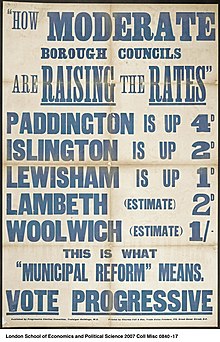History

It was founded in 1888 by a group of Liberals and leaders of the labour movement. It was also supported by the Fabian Society, and Sidney Webb was one of its councillors. In the first elections of the London County Council (LCC) in January 1889 the Progressive Party won 70 of the 118 seats. It lost power in 1907 to the Municipal Reform Party (a Conservative organisation) under Richard Robinson.
